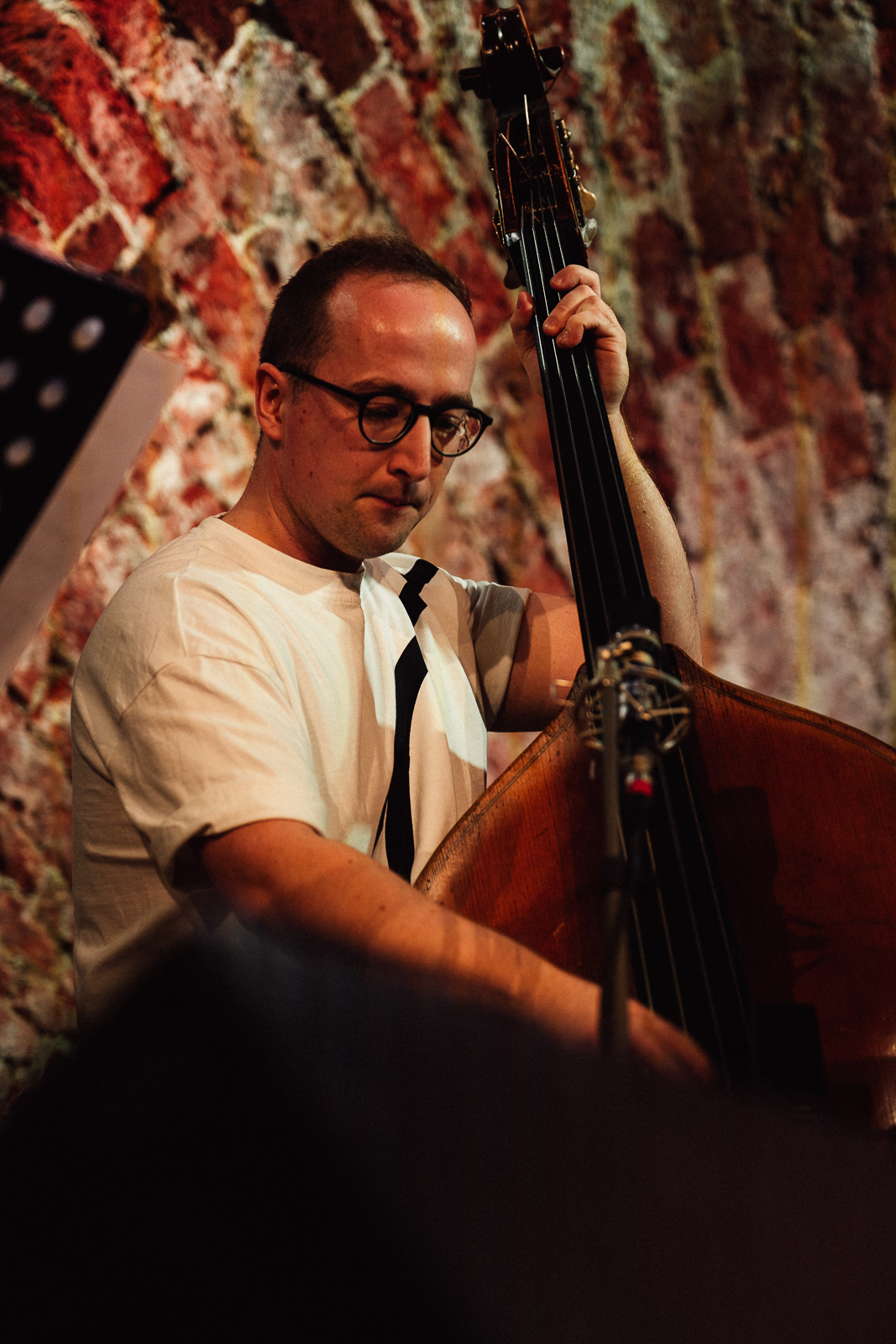I Too Am Safari

It's okay to be suspicious, because talk about the working class has often congealed into a hollow ritual in recent decades. Decency and moralism prevail, but nothing happens. But what sometimes mutates into farce succeeds brilliantly here.
James Banner premiered "Class Work" on Tuesday. The musicians, consisting of two double basses, saxophone, viola and two singers, all have a "working class" background and process their experiences musically on stage.
Banner and Nick Dunston start a bass duet with enormous pressure. Megan Jowett and Angelika Niescier on viola and saxophone join in. Soon the singers Ryan Gleave and Friede Merz shout to the audience: "I am Safari!
At the beginning, you have the feeling that you are in a madhouse. Sensory overload seems to be imminent. But the famous order in the chaos is clearly recognizable. We also listen to the realization on stage that people are talking about you, but not to you. Helplessness, anger, resignation are the result. "And we race to the bottom." The constant fear for one's own economic existence resounds. A furious start, so far so good!
It calms down a bit. Dunston goes to his effects equipment.
In the first moment one asks oneself: Does it need it now? Electronic sounds are reflexively used in a large part of improvised music to simulate a certain joy of experimentation.
But as the duration progresses, the relevance of this also performative moment becomes clear. While the analog playing practice of the musicians is craft, i.e. physical work, the technological component here forms the counterpart in terms of content. You can hear perverted sounds from techno and trap, noise, as well as a minute-long radio report that is received slightly off the right wavelength. Or are they radio messages after all?
Technology, which in theory can help make work and everyday life easier, turns into the opposite here, becoming a scourge, a trigger of disempowerment and loneliness. It is the basis of an entertainment industry, in the sense of carrot and stick. A media paternalism is clearly remembered.
The signal tones of a freight train crossing sound and leave little doubt: there it goes, time, working time, and with it the possibility of self-empowerment is slowly fading.
Rylan Gleave and Friede sing first plaintively, then accusingly of individual suffering and - supported by the fantastic instrmentalists - soon swell to a lamenting chorus of millions. They make use of recitative forms that proclaim to us feelings, life circumstances, sometimes only sadly ordinary things, again and again. This is the sound of everyday life set to music. The constantly repeated "complaints" of the "lower class" are not, however, exposed to ridicule here, as seems to have been the media tone for decades. It is not individuals who repeat themselves, it is the depression in the collective.
"Class Work" is also not purely musical, we also see theater. Performances of individuals, whether in song or instrument, which are immediately supported in agreement. People interrupt each other and then all speak together. Mono and dialogue become again and again the chorus of a shared life situation.
At the end there is a refreshingly pointed commentary on the role of jazz in the whole potpourri. All participants lapse into a kind of avant-garde jazz bossa, a subgenre that, appropriated by countless easy listening samplers and playlists, can serve as a cipher for the harmless, the conformist. The soundtrack, so to speak, of the last 60 years, in which "Western" revolutions were contested either sexually or peacefully. Sloterdijk's sentence "All roads of 68 ultimately lead to the supermarket" is true. Only for some more often and more fruitfully than for others.
When they sing: "I had herrings everyday for lunch. We were told it was nice," you have to smile, swallow, become sad, only to feel ashamed shortly afterwards - after which at least the author of this text is annoyed at his own stupidity. The parody is biting, finally some content.
Theoretically, all the stylistic means of performance in themselves are nothing new. In concerts of similar musical design, the question after that is often justified: "Yes, full interesting. And now?" Here, however, they are used excellently, well dosed and dramaturgically cleverly arranged. It never becomes pompous or pseudo-intellectual. Again and again we get hints in music and words that help us through the complex piece, but no interpretation is given. There remains enormous room for interpretation, which makes the work so exciting. It is an enriching and meaningful contribution to the class question. A topic that is far too under-lit for its ever-present, aching relevance.
